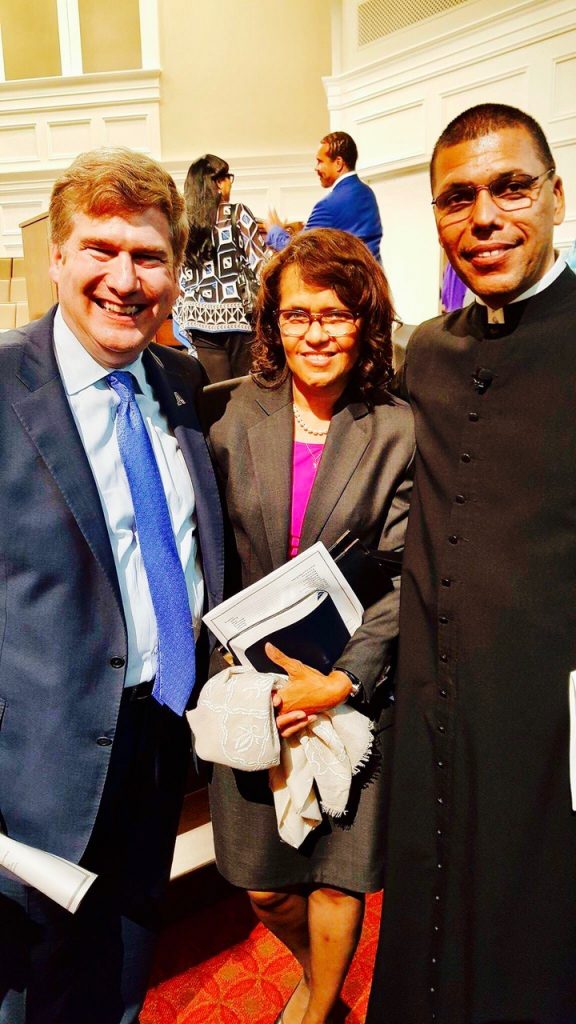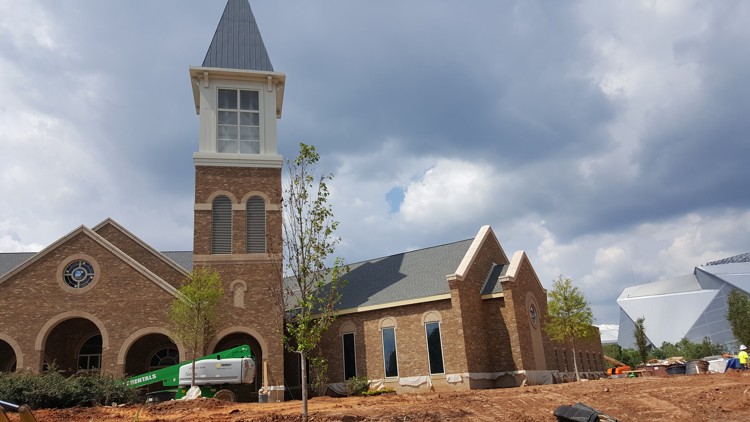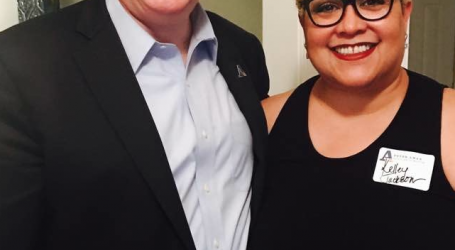A New Home for Atlanta’s Venerable Friendship Baptist Church; Visiting Black Churches Still Compulsory for Mayoral Candidates
By Maynard Eaton
Ever since the historic election of Maynard Jackson as Atlanta’s first African American mayor in 1973, courting the black vote with weekly campaign visits to the city’s plethora of influential black churches has been a necessity. Those mandatory Sunday church appearances have become even more essential in the 2017 Atlanta mayoral contest as three of the nine major candidates – Mary Norwood, Peter Aman and Cathy Woolard – compete to be elected the city’s first white mayor in 44 years.
 That’s why mayoral hopefuls Aman, Ceasar Mitchell, Keisha Lance Bottoms and Vincent Fort were front and center, among other elected officials and candidates, for the historic dedication ceremonies of the new Friendship Baptist Church on Sunday, July 30th. Those not there that day were noticeable by their absence. “I was shocked that Mary Norwood wasn’t there, because she is usually right there in front of everything,” said Dr. Gerald Durley, pastor emeritus of Providence Baptist church and widely considered the “dean” of Atlanta’s African American ministers. “I think that they [mayoral candidates] recognize the importance of being at Friendship.”
That’s why mayoral hopefuls Aman, Ceasar Mitchell, Keisha Lance Bottoms and Vincent Fort were front and center, among other elected officials and candidates, for the historic dedication ceremonies of the new Friendship Baptist Church on Sunday, July 30th. Those not there that day were noticeable by their absence. “I was shocked that Mary Norwood wasn’t there, because she is usually right there in front of everything,” said Dr. Gerald Durley, pastor emeritus of Providence Baptist church and widely considered the “dean” of Atlanta’s African American ministers. “I think that they [mayoral candidates] recognize the importance of being at Friendship.”
Friendship Baptist has always been a significant port-of-call for those seeking Atlanta’s top job. It’s revered as Black Atlanta’s “Mother Church” and held in high esteem.
“The Black Church has and remains exceptionally relevant within all political landscapes,” says Dr. Joseph Williams, who co-pastor’s Atlanta’s Salem Bible Church along with his father and political rainmaker Rev. Jasper Williams, Jr. “The Black Church was instrumental in the manifestation of the Civil Rights movement of the 60’s, the election of our nation’s first African American President, Barak Obama, and it remains a meeting center of power, thought and leadership in the 21st century.”
Friendship is an iconic Atlanta African American church and congregation. Established in 1862, Friendship was the first, independent, Black Baptist congregation in Atlanta. Its members have been major movers and shakers ever since. Friendship has produced an array of notable leaders in the fields of education, business and politics, including Mayor Maynard Jackson, Jr., son of Friendship’s third pastor. Classes for both Morehouse and Spelman Colleges began in this esteemed church. That is why Friendship’s new day and new home dedication service was so politically important, and perhaps consequential, for the mayoral candidates.
“The “Black” Church in Atlanta, especially congregations that are historical and politically involved like Friendship Baptist will play a supremely vital role in shaping who becomes our next mayor in the city,” opines political pundit and CBS radio talk show host Dr. Rashad Richey. “Elections are simple; get more people to vote for you than the other person. Our churches are full of voters, but will the church be able to hold those elected to office accountable to a moral ethical agenda in government.”
Skeptics question whether the Black Church “is that important anymore” in this digital age of social media, but longtime political activist Minister Steven Muhammad debunks that theory.
“You cannot create any kind of movement or do anything where you need the masses of the people and not go to the church,” Muhammad says. “We’re the Nation of Islam and when we get ready to do a major event, The Million Man March or whatever, the first place we go is to the church. Because the church is where our people are. The pastors have the influence and the ear of our people. Now, if you go back through the history of our people and voting here in Atlanta, you have the old bi-partisan Negro Voting League with [the late] John Calhoun and Rev. William Holmes Borders when they started that movement back in the ‘40’s, it was to allow white politicians to come into the Black Church to speak to Black people. That tradition has been there ever since.”
That tradition may well pay off for either Norwood, Aman and Woolard in this election Muhammad and others say.
“Friendship is the soul of Atlanta,” opines candidate Aman in an interview following the dedication services. “From giving birth to the AUC to its significance to the west side of Atlanta, Friendship has influenced and inspired the best and brightest our city has known. I had to be here to pay my respects and I wanted to be here to be a part of the next phase. It is an honor to celebrated the new sanctuary and join the Friendship family in worship.”
Aman’s church attendance was no perfunctory courtesy visit. He is aggressively wooing black congregations for a winning share of Atlanta’s African American electorate in his passionate mayoral bid. Aman has met with Dr. Joseph Williams and other Black preachers seeking their validation. It’s important; perhaps providential and pivotal for his first ever political campaign.
Aman’s campaign manager, Fred Hicks, and communications director, Saba Long, are both persons of color. And, he strategically headquartered his campaign operations on “Sweet” Auburn Avenue –once hailed as the “richest Negro street in America.”
“To me it means something more important than anything about the mayoral campaign,” added Aman, who previously served as Mayor Kasim Reed’s Chief Operating Officer. “It’s about the community and the rebuilding of this church but keeping it in the community. One of the things that is special about Atlanta is how inclusive we are, and how we set the example in many ways for other cities. Clearly Friendship has done that. This is an important milestone in the city.”
One of Aman’s chief African American challengers, City Council President Mitchell was not to be outdone or outworked on this Freedom dedication day it seemed. Friendship is his home turf.
“I probably wouldn’t be talking to you as the next mayor of Atlanta or as your City Council President if there wasn’t a Friendship Baptist Church because there would be no Morehouse College. This church was really our city’s first incubator,” Ceasar Mitchell told this reporter following his greetings to an estimated 1,100 congregation members.
Mitchell is a Morehouse College graduate. “My longtime relationship has allowed me to see the churches vision. Before there was even an idea that there would be a new stadium, this church was investing in this community and making plans. It made critical real estate acquisitions in this area.”
Henrietta Antonin is a retired, politically powerful Atlanta Life Insurance Company executive, art collector/curator and lifetime member of Friendship. The church she loves has been the pillar of her life, she says. Three years later, Antonin still vehemently disagrees with the political wrangling and ultimate buyout that forced Friendship to abandon it’s 100-year Vine City home and move to a new place of worship just two blocks away to make way for the $1.6 billion Mercedes Benz Stadium on Northside Drive.
“This is a new day,” Antonin opined proudly and painfully. “I’m from the old school. I loved our old church and didn’t want to move. I didn’t think $19 million was enough for the prime space that we had and the legacy that we had, and the heritage that we had and the memories that I have.”
As the result of robust, agonizing and politically controversial negotiations, Friendship Baptist, and nearby Mount Vernon were bought out and demolished to make way for the Atlanta Falcons new state-of-the-art facility, and the new shops and restaurants likely to follow in the rapidly gentrifying surrounding neighborhoods. As AJC.com recently reported, some 43 percent of families residing in four neighborhoods near the new stadium – including Vine City and English Avenue – live below the poverty line, according to the Westside Future Fund. The median household in the area is just $24, 778. That’s nearly half the city-wide average of $48, 405. It remains a politically dicey dilemma for the mayoral contestants and others.
There is arguably no one Atlanta biblical scholar that knows more about the power and political influence of the Black Church in Atlanta than Dr. Gerald Durley, of Providence Baptist Church in SW Atlanta. He has traveled the world extoling the gospel and goodness of Atlanta’s interracial harmony. Since joining the ministry in the mid-‘60’s, this civil and human rights activist has been known as Atlanta’s “warrior preacher.”
“It has lost the kind of strength and power that we once had as congregations,” Durley bemoans of the Black Church in Atlanta’s political elections. “The Black Church now not only has to garner its own memberships, but we’ve got to do coalitions and collaborations with other voting blocs. We can continue to talk to our own, but we now must begin to build those bridges. That calls for a transformation in our thinking.”
Dr. Joseph Williams is a nationally respected theologian, nutritionist, author, singer, and civil rights public policy proponent. The politically savvy Morehouse graduate is also a recipient of the Informer Newspaper’s coveted America’s Top 40 Pastors Under 40 honors. Williams is a rare and revered breed and brand.
So, because of his increasing clerical and civic clout, Williams’ political endorsement of a candidate in the Atlanta 2017 mayor’s race is a highly sought after blessing and benefit.
“Although the Black Church retains its power and influence, the black community is losing its power and influence throughout the nation in a process known as gentrification,” Williams muses remorsefully. “The crafty insidious agenda that was designed to move African Americans out of major cities to disrupt its voting base and economic impact all in the name of capitalism is the fight that is before us.”
Dr. Williams continues, “The Black Church is the only voice that can address these issues and bring light onto the Atlanta Mayoral race. It is important that Black pastors are entrenched within this process in not only the election of who represents our community, but holding our elected officials accountable on all fronts.




